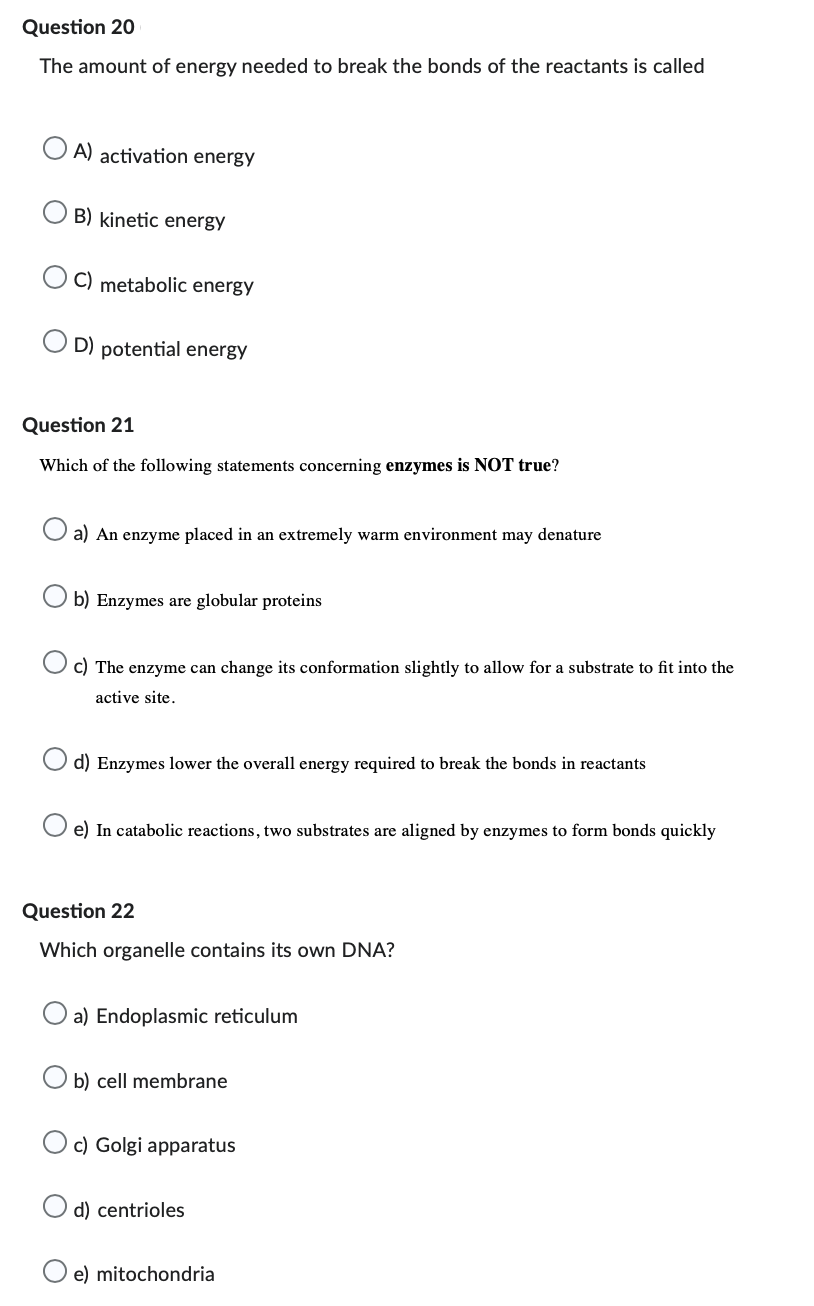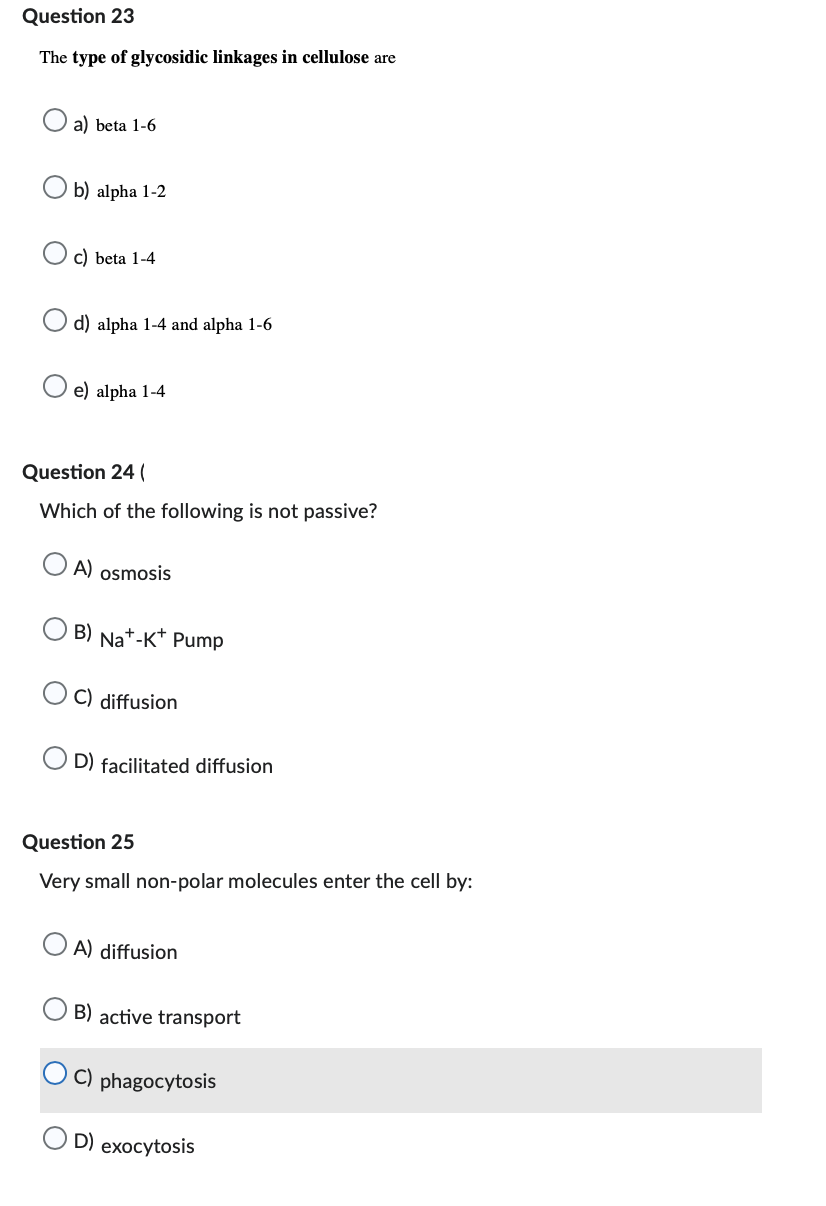Human Anatomy & Physiology (11th Edition)
11th Edition
ISBN:9780134580999
Author:Elaine N. Marieb, Katja N. Hoehn
Publisher:Elaine N. Marieb, Katja N. Hoehn
Chapter1: The Human Body: An Orientation
Section: Chapter Questions
Problem 1RQ: The correct sequence of levels forming the structural hierarchy is A. (a) organ, organ system,...
Related questions
Question

Transcribed Image Text:Question 20
The amount of energy needed to break the bonds of the reactants is called
A) activation energy
B) kinetic energy
C) metabolic energy
D) potential energy
Question 21
Which of the following statements concerning enzymes is NOT true?
a) An enzyme placed in an extremely warm environment may denature
b) Enzymes are globular proteins
c) The enzyme can change its conformation slightly to allow for a substrate to fit into the
active site.
d) Enzymes lower the overall energy required to break the bonds in reactants
e) In catabolic reactions, two substrates are aligned by enzymes to form bonds quickly
Question 22
Which organelle contains its own DNA?
a) Endoplasmic reticulum
b) cell membrane
c) Golgi apparatus
d) centrioles
e) mitochondria

Transcribed Image Text:Question 23
The type of glycosidic linkages in cellulose are
a) beta 1-6
b) alpha 1-2
c) beta 1-4
d) alpha 1-4 and alpha 1-6
e) alpha 1-4
Question 24 (
Which of the following is not passive?
A) osmosis
B) Nat-K+ Pump
C) diffusion
D) facilitated diffusion
Question 25
Very small non-polar molecules enter the cell by:
A) diffusion
B) active transport
C) phagocytosis
D) exocytosis
Expert Solution
This question has been solved!
Explore an expertly crafted, step-by-step solution for a thorough understanding of key concepts.
Step by step
Solved in 2 steps

Knowledge Booster
Learn more about
Need a deep-dive on the concept behind this application? Look no further. Learn more about this topic, biology and related others by exploring similar questions and additional content below.Recommended textbooks for you

Human Anatomy & Physiology (11th Edition)
Biology
ISBN:
9780134580999
Author:
Elaine N. Marieb, Katja N. Hoehn
Publisher:
PEARSON

Biology 2e
Biology
ISBN:
9781947172517
Author:
Matthew Douglas, Jung Choi, Mary Ann Clark
Publisher:
OpenStax

Anatomy & Physiology
Biology
ISBN:
9781259398629
Author:
McKinley, Michael P., O'loughlin, Valerie Dean, Bidle, Theresa Stouter
Publisher:
Mcgraw Hill Education,

Human Anatomy & Physiology (11th Edition)
Biology
ISBN:
9780134580999
Author:
Elaine N. Marieb, Katja N. Hoehn
Publisher:
PEARSON

Biology 2e
Biology
ISBN:
9781947172517
Author:
Matthew Douglas, Jung Choi, Mary Ann Clark
Publisher:
OpenStax

Anatomy & Physiology
Biology
ISBN:
9781259398629
Author:
McKinley, Michael P., O'loughlin, Valerie Dean, Bidle, Theresa Stouter
Publisher:
Mcgraw Hill Education,

Molecular Biology of the Cell (Sixth Edition)
Biology
ISBN:
9780815344322
Author:
Bruce Alberts, Alexander D. Johnson, Julian Lewis, David Morgan, Martin Raff, Keith Roberts, Peter Walter
Publisher:
W. W. Norton & Company

Laboratory Manual For Human Anatomy & Physiology
Biology
ISBN:
9781260159363
Author:
Martin, Terry R., Prentice-craver, Cynthia
Publisher:
McGraw-Hill Publishing Co.

Inquiry Into Life (16th Edition)
Biology
ISBN:
9781260231700
Author:
Sylvia S. Mader, Michael Windelspecht
Publisher:
McGraw Hill Education